
Anthropology Today
Scope & Guideline
Charting New Territories in Anthropological Studies
Introduction
Aims and Scopes
- Ethnographic Research and Methodologies:
The journal consistently publishes papers employing ethnographic methods to explore diverse cultural practices, social dynamics, and human behaviors in various contexts, from local communities to global phenomena. - Interdisciplinary Approaches:
Anthropology Today embraces interdisciplinary research, drawing insights from sociology, cultural studies, political science, and environmental studies to enrich anthropological discourse and address complex issues. - Focus on Global Issues:
The journal highlights anthropological perspectives on contemporary global challenges such as climate change, migration, health crises, and social justice, encouraging researchers to connect local experiences with global trends. - Cultural and Social Critique:
Many papers critically examine cultural norms, power dynamics, and social structures, contributing to discussions on ethics, indigenous rights, and the implications of globalization. - Engagement with Emerging Technologies:
The journal explores the intersections of anthropology with emerging technologies such as blockchain, AI, and digital culture, examining their impact on society and cultural practices.
Trending and Emerging
- Ethics in Anthropological Research:
A significant increase in discussions around research ethics, particularly in relation to bureaucratization and the responsibilities of anthropologists in the field, reflects a growing concern for ethical practices amid changing research landscapes. - Impact of Digital Culture and Technology:
There is a notable trend towards examining the implications of digital technologies, including blockchain and AI, on social structures and cultural practices, highlighting anthropology's relevance in understanding modern technological transformations. - Climate Change and Environmental Anthropology:
Papers addressing climate change and environmental issues are on the rise, emphasizing the anthropological contribution to understanding human-environment interactions and advocating for sustainable practices. - Health and Illness in Sociocultural Contexts:
Recent publications increasingly explore the intersections of health, illness, and culture, particularly in the wake of global health crises like the COVID-19 pandemic, reflecting a growing interest in medical anthropology. - Social Movements and Political Anthropology:
A trend towards examining social movements, political upheavals, and grassroots organizing reflects anthropology's engagement with contemporary political issues and the role of cultural practices in activism.
Declining or Waning
- Traditional Kinship Studies:
While kinship remains a foundational concept in anthropology, there has been a noticeable decrease in papers specifically focused on traditional kinship structures, as contemporary research increasingly emphasizes broader social networks and fluid identities. - Historical Anthropology:
The exploration of historical contexts through an anthropological lens has become less frequent, with more emphasis placed on contemporary issues and real-time ethnography, possibly due to the urgency of addressing pressing global challenges. - Local Cultural Practices in Isolation:
There is a decline in studies that focus solely on isolated cultural practices without connecting them to broader social, economic, or political contexts, indicating a shift towards more integrative and comparative approaches. - Studies of Indigenous Cultures without Contextualization:
Research centered solely on Indigenous cultures, without considering their interactions with global systems or contemporary issues, appears to be waning, as there's a growing recognition of the need for contextualized understandings.
Similar Journals
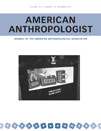
AMERICAN ANTHROPOLOGIST
Shaping the future of anthropology with impactful scholarship.American Anthropologist is a prestigious journal published by Wiley, dedicated to advancing the field of anthropology. With a rich publishing history dating back to 1888, it has become a leading platform for scholarly discourse, showcasing innovative research and diverse perspectives from around the globe. The journal holds impressive ranks within its categories, being recognized as Q1 in both Anthropology and Arts and Humanities, alongside a notable Scopus ranking of #36 out of 502 in Social Sciences. Its robust impact in academia is reflected in its emphasis on interdisciplinary approaches that resonate within the fields of social science and humanities. Researchers and students alike are encouraged to contribute to this vital resource that continues to shape anthropological thought and practice. For those interested, the journal is tailored for non-open access, ensuring the curation of high-caliber scholarly work accessible to a wide audience while supporting the standards of peer-reviewed publications.
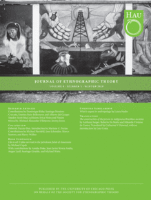
HAU-Journal of Ethnographic Theory
Unveiling the Complexity of Cultures through Rigorous Ethnographic Theory.HAU-Journal of Ethnographic Theory, published by University of Chicago Press, stands as a leading platform for scholarly discourse in the field of anthropology. Established in 2011, this esteemed journal focuses on ethnographic methodologies and theoretical advancements, offering a significant contribution to the understanding of human cultures and social practices. With an impressive Q2 ranking in anthropology and a strong placement in the 63rd percentile among peers in the Scopus rankings, HAU ensures high visibility and impact within the academic community. Although the journal currently does not offer open access, it is widely available for institutions, fostering a global dialogue among researchers, professionals, and students. As it converges its content towards 2024, HAU remains dedicated to publishing innovative research that challenges existing paradigms and encourages critical reflection, solidifying its importance in the continuous evolution of ethnographic theory.
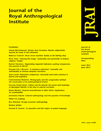
JOURNAL OF THE ROYAL ANTHROPOLOGICAL INSTITUTE
Navigating the Complexities of Human ExperienceJOURNAL OF THE ROYAL ANTHROPOLOGICAL INSTITUTE, published by Wiley, stands as a prestigious platform for scholarly discourse in the field of anthropology. With an ISSN of 1359-0987 and an E-ISSN of 1467-9655, this journal has been a vital resource for researchers, professionals, and students since its inception, featuring contributions that push the boundaries of understanding in both cultural and social anthropology. The journal’s rigorous peer-review process affirms its high academic standards, reflected in its top-tier Q1 rankings in both the Anthropology and Arts and Humanities categories for 2023. With a current ranking of #78 out of 502 in Social Sciences Anthropology and #138 out of 552 in Miscellaneous Arts and Humanities, it inhabits a critical space within academia, addressing seminal issues and innovative research. While the journal is not open access, it remains accessible to those affiliated with institutions that provide subscriptions, ensuring that groundbreaking anthropological insights are disseminated widely within the academic community. As it converges from 1995 to the present, the JOURNAL OF THE ROYAL ANTHROPOLOGICAL INSTITUTE continues to shape the landscape of anthropological research, engaging a diverse readership eager to explore the intricate tapestry of human cultures.
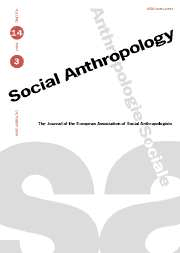
Social Anthropology
Decoding Cultural Norms in a Changing WorldSocial Anthropology is a leading journal published by BERGHAHN JOURNALS, focusing on the diverse and dynamic field of anthropology. With an ISSN of 0964-0282 and an E-ISSN of 1469-8676, this open-access journal has been a cornerstone of scholarly communication since its inception in 1982, becoming fully accessible to the public since 2022. Situated in the United States, the journal aims to disseminate high-quality research that explores sociocultural dimensions of human behavior across various contexts, addressing pressing contemporary issues through a multidisciplinary lens. With impressive rankings, including Q2 in Anthropology and Arts and Humanities, and strong positions in Sociology and Developmental Psychology according to Scopus metrics, Social Anthropology serves as an essential platform for researchers, professionals, and students committed to advancing our understanding of social practices and cultural norms. Its commitment to fostering intellectual discourse makes it a vital resource for those seeking to deepen their knowledge and insight into the anthropological landscape.

ANTHROPOLOGICAL QUARTERLY
Illuminating Contemporary Issues Through Scholarly RigorANTHROPOLOGICAL QUARTERLY, published by the George Washington University Institute of Ethnographic Research, stands as a vital resource in the field of anthropology and broader arts and humanities studies. With an ISSN of 0003-5491 and an E-ISSN of 1534-1518, this esteemed journal has been contributing to academic discourse since its establishment in 1981. The journal holds a respected position in both the Q2 category for Anthropology and the Q2 category for Arts and Humanities (miscellaneous), demonstrating its impact and relevance, as evidenced by its rank of #152 out of 502 in the Social Sciences sector for anthropology and rank of #179 out of 552 in the Arts and Humanities field. Researchers, professionals, and students can rely on ANTHROPOLOGICAL QUARTERLY for rigorous peer-reviewed articles that push the boundaries of ethnographic research and anthropological theory, addressing contemporary issues with scholarly precision. The journal’s commitment to fostering critical analysis and interdisciplinary perspectives establishes it as an essential platform for advancing knowledge within its diverse and dynamic field.

Anthropological Notebooks
Cultivating Innovative Ideas in Contemporary AnthropologyAnthropological Notebooks, published by the SLOVENE ANTHROPOLOGICAL SOC, is a noteworthy journal within the field of anthropology. Established in Slovenia, this journal aims to provide a platform for scholarly dialogue and dissemination of anthropological research, fostering interdisciplinary approaches and global perspectives. Although it currently holds a Q4 quartile ranking in anthropology and ranks #421 out of 502 in Scopus, it serves as an essential conduit for emerging voices and innovative ideas in the discipline. Covering research published from 2010 to 2019 and from 2021 to 2024, the journal invites contributions that explore diverse cultural narratives and anthropological insights. Despite its limited open access options, Anthropological Notebooks remains a crucial resource for researchers, professionals, and students seeking to engage with contemporary anthropological discourse and enrich their understanding of human societies.

Social Analysis
Unpacking the Dynamics of Human ExperienceSocial Analysis, an esteemed academic journal published by BERGHAHN JOURNALS, is at the forefront of interdisciplinary research, focusing on the dynamic intersections of anthropology, cultural studies, sociology, and the arts and humanities. Since its inception in 2002 and having transitioned to an Open Access model in 2020, the journal ensures that critical social research is widely accessible to scholars and the public alike. With an impressive Q1 ranking in Anthropology and cultural studies and holding a notable Q2 in Sociology and Political Science, it garners attention from a large academic audience, as evidenced by its high Scopus rankings: 10th in general arts and humanities and 153rd in cultural studies. This signifies its influential role in shaping contemporary discourse and providing a platform for innovative ideas and methodologies in understanding social phenomena. Based in Brooklyn, NY, the journal is dedicated to fostering scholarly dialogue and advancing the field, making it an essential resource for researchers, professionals, and students eager to engage with and contribute to the field of social analysis.

ZEITSCHRIFT FUR ETHNOLOGIE - Journal of Social and Cultural Anthropology
Capturing the Essence of Human ExperienceZEITSCHRIFT FUR ETHNOLOGIE - Journal of Social and Cultural Anthropology, published by DIETRICH REIMER VERLAG, serves as a vital platform for the dissemination of high-quality research in the fields of social and cultural anthropology. Established with a commitment to advancing scholarly dialogue, this journal captures the dynamic interplay of cultural practices and social structures across diverse contexts. With an ISSN of 0044-2666, it gained significant traction among researchers, ranking in Q3 for Cultural Studies and Q4 for miscellaneous Social Sciences in 2023. Its Scopus ranking reflects its growing impact, particularly within the 68th percentile of Cultural Studies. Although the journal does not offer open access, it remains a crucial resource for academia, fostering critical insights and innovative analyses essential for students, professionals, and scholars alike. With a publication history highlighted by a convergence of issues from 1981 and various intervals, the journal is poised to shape debates in anthropological research both locally within Germany and globally.
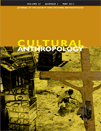
CULTURAL ANTHROPOLOGY
Connecting Scholars to the Heart of Cultural StudiesCULTURAL ANTHROPOLOGY is a premier journal in the field of anthropology, published by the esteemed SOC CULTURAL ANTHROPOLOGY. With an impressive impact factor and ranking in the Q1 category for both anthropology and arts and humanities, it stands as a leading platform for scholarly discourse and innovative research. Since transitioning to Open Access in 2014, the journal has made substantial contributions to the accessibility of anthropology literature, allowing a broader audience to engage with cutting-edge anthropological insights and findings. The journal's scope encompasses a wide range of cultural studies and anthropological perspectives, catering to a diverse readership that includes researchers, professionals, and students. Published from the Department of Anthropology, Rice University in Houston, Texas, CULTURAL ANTHROPOLOGY continues to shape the conversation in its field, promoting interdisciplinary dialogue and enriching the academic landscape.
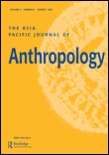
Asia Pacific Journal of Anthropology
Fostering Dialogue on Asia Pacific AnthropologyAsia Pacific Journal of Anthropology is a premier academic journal dedicated to advancing the field of anthropology and cultural studies, published by Routledge Journals, Taylor & Francis Ltd. With an ISSN of 1444-2213 and E-ISSN 1740-9314, this journal has gained recognition for its rigorous scholarly contributions since its inception in 2000. Situated in the UK, it is strategically positioned to serve as a vital resource for researchers, professionals, and students exploring the rich complexities of human societies and cultures within the Asia Pacific region and beyond. As evidenced by its Q2 ranking in both anthropology and cultural studies for 2023, alongside its impressive Scopus ranks—#218 among 1304 in Cultural Studies and #157 among 502 in Anthropology—this journal illustrates a strong commitment to delivering high-quality, impactful research. While it is not an open-access journal, it remains a key platform for disseminating innovative research and fostering academic dialogue, thereby significantly contributing to the advancement of knowledge in the social sciences.